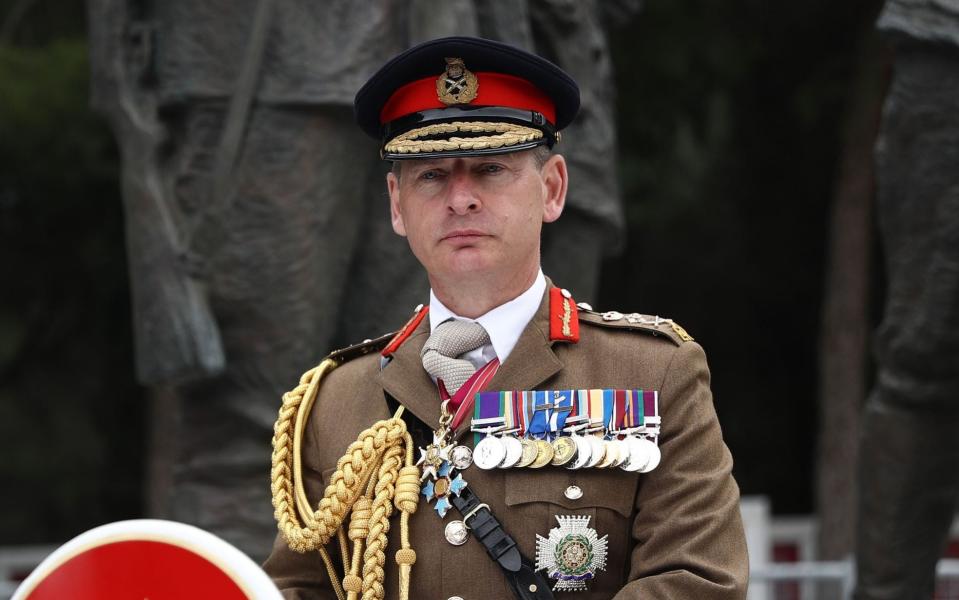Army to have a 'more persistent presence' in Asia, Chief of the General Staff has said

The Army is to have a "more persistent presence" in Asia, the Chief of the General Staff has said, ahead of the government’s Integrated Review.
General Sir Mark Carleton-Smith said a greater presence overseas will reverse the process of withdrawal seen after 9/11 when the focus of the armed forces shifted to the Middle East.
The head of the army was outlining the likely shape of his service that will emerge from the government’s Integrated Review of foreign, defence and security policy, which is expected to report in November.
Describing a more dynamic and active posture for the army in future years, General Carleton-Smith suggested RAF bases and the Royal Navy’s new aircraft carriers could provide “lily pads” from which the army could operate with allies.
“We think there is a market for a more persistent presence from the British Army [in the Far East].
“It’s an area that saw a much more consistent Army presence in the 1980s but with 9/11 we naturally receded from it. We think now might be the time to redress that imbalance.
“If we are going to see a UK presence in the region from [Royal Navy] Carrier Strike Groups I would like to see some of those naval assets disembarking elements of the British Army for their own training in that part of the world.”
The head of the army was speaking in advance of a speech on Wednesday from the Defence Secretary and the Chief of the Defence Staff about the future strategy for the armed forces.
Ben Wallace and General Sir Nick Carter will outline the Integrated Operating Concept which will seek to address how Britain’s military forces will operate alongside allies and other government departments such as intelligence agencies in the future.
Britain has been keen for some time to expand military ties with countries such as Japan and South Korea, partly as a response to an increasingly muscular China.
Having a more persistent army presence in the region will “change narratives, provide reassurance to allies and deterrence for adversaries,” General Carleton-Smith said.
“They will give the UK more strategic choice and influence.”
The Telegraph understands Central and South America and East Africa are regions also being considered for an expanded British Army presence.
General Carleton-Smith said a priority after the Integrated Review will be to grow Britain’s Special Operations and intelligence forces.
The army chief said UK special forces was “one of our most valued and relevant strategic assets” and should be enhanced.
The former SAS commander said Russia should be challenged for operating “on the seams and blurred boundaries of our security and legal frameworks”, respecting “neither borders nor the rules-based order”.
“We need forces to shine a light into the shadows,” he said.
Countering recent speculation that the review would get rid of much of Britain’s fleet of tanks and other armoured vehicles, the head of the army insisted the “capability to warfight” would balance a lighter and more agile force, and was necessary to “underpin flexible modern deterrence”.
“Competitors operate below the threshold of war precisely because we maintain one,” he said.
Sir Chris Deverell, the former Commander of Joint Forces, told the Telegraph General Carleton-Smith was “right to conclude that it would be foolish to throw away our warfighting capability in pursuit of our adversaries in cyberspace”.
Tools such as cyber and disinformation were used by Britain’s adversaries below the threshold of war “precisely because we maintain the ability to win above that threshold,” he said.
However, he cautioned the Defence budget would be under increased pressure if a lighter and more technical military was developed alongside existing structures.
“We continue to need ‘boots’ as well as ‘bots’. But holding this creed is not the same as explaining how it can be achieved if there is to be no more money for Defence.
“How well the Government takes this trick will be the key way to measure the success of the Integrated Review.”

